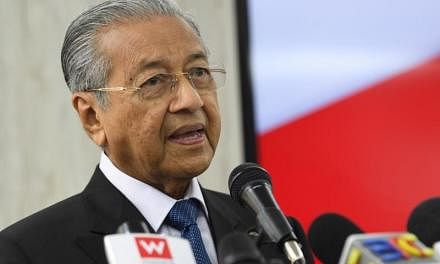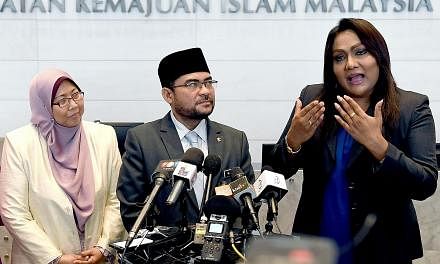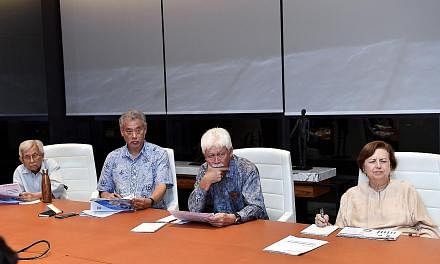PUTRAJAYA (THE STAR/ASIA NEWS NETWORK) - It is unlikely that there will be a Malay tsunami in the upcoming 14th general election, according to Prime Minister Najib Abdul Razak.
"I don't detect a Malay tsunami. Malay tsunami would mean a rejection of Umno. I don't see that (happening).
"We had taken part in by-elections (before that served) as a test as well as an assessment of the (Malay) feelings on the ground. I don't see a Malay tsunami," he told senior editors at his office in Putrajaya on Wednesday (April 4).
The chairman of ruling coalition Barisan Nasional (BN), who has been visiting various states in the run-up to the general election, said the mood and sentiment among the people were good and it was better than the last election.
When the election results five years ago were released, Datuk Seri Najib concluded that it was the "Chinese tsunami" that caused the number of BN seats to shrink.
As for Chinese voters' mood this time round, Mr Najib said it was hard to say.
"MCA says the Chinese will come back (to BN)," he said, referring to BN component party Malaysian Chinese Association.
He said: "For the Chinese voters, you will only detect (the voting patterns at the) last minute because they are strategic voters.
"They will vote based on certain considerations. So, we don't know yet for sure. Nobody knows for sure."
However, Mr Najib emphasised that the Chinese would get a better deal with BN, particularly in terms of having a stronger representation in the government.
He said: "I can't keep on giving four or five ministerial (posts) if they don't support BN. So, they (Chinese voters) have to make a choice.
"If the country prospers, so will the Chinese. If we move strongly economically, the Chinese community in the country will benefit."
On new opposition party Parti Warisan Sabah led by former Umno strongman Mohd Shafie Apdal, Mr Najib said the party was not strong enough to create a political tsunami in Sabah.
Earlier, in what was seen as his last session with civil servants before the general election, the Prime Minister assured them that the government is committed to advancing the public sector and looking after the welfare of the 1.6 million staff serving the people and the nation.
Mr Najib said this commitment by the government of the day under Barisan Nasional is in contrast with the opposition, which continues to criticise and run down public officers.
Addressing some 10,000 civil servants from both federal and state offices at the annual civil service assembly on Wednesday, the Prime Minister was saddened by derogatory statements made by the opposition, with some labelling public officers as kucing kurap (people of no significance).
"Let them have that attitude. What is for sure is that civil servants can always depend on the Barisan-led government to look after and defend them," he told the crowd.
Saying that he values their services and contributions, Mr Najib said that in his 40 years in politics, civil servants had played an important role in helping him serve the nation.
"There is a proposal by the Penang Institute to reduce the number of civil servants to 430,000. This means the services of 1.2 million staff will be terminated, rendering them unemployed."
"As if this is not enough, a leader from 'Parti Bunga Raya' made a statement about sacking all senior civil servants if the party governs after the general election," he said in reference to Parti Pribumi Bersatu Malaysia.
Talk is rife that the Prime Minister will announce the dissolution of Parliament on Friday.
Recapping some of Malaysia's recent successes, the Prime Minister said the government owed its achievements to civil servants who helped roll out its transformation plans, policies and initiatives.
These had, among other things, resulted in a 5.9 per cent growth in gross domestic product last year - among the highest growth rates in the world.
Malaysia also received positive credit ratings from international agencies Moody's, Standard & Poor and Fitch Ratings, and was listed as the 23rd most competitive nation among 137 countries by the Global Competitiveness Index.
The latest feather in the cap for Malaysia came on March 28 when the Saudi Arabia government's company Aramco injected US$7 billion (S$9.2 billion) of funds, which are expected to spur economic growth and create job opportunities, Mr Najib noted.









